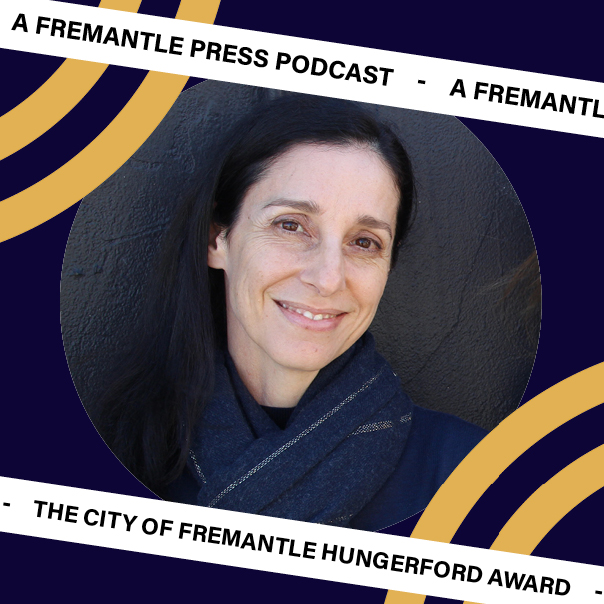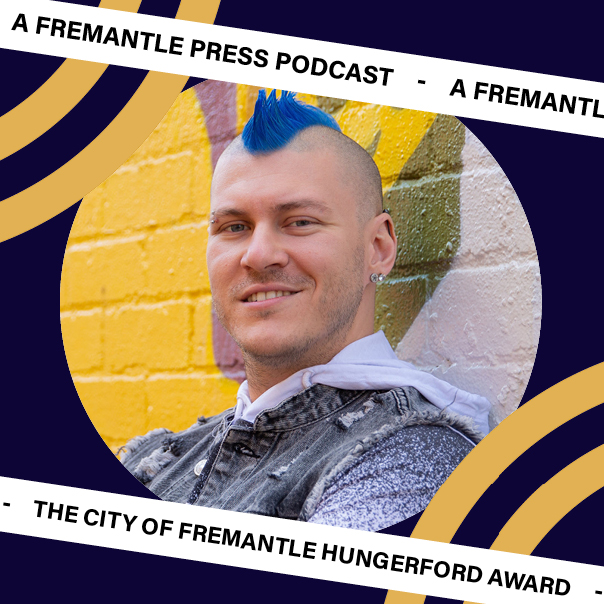Episode Transcript
[00:00:06] Speaker A: Hello and welcome to how to avoid a Happy the podcast.
This podcast is a companion to how to avoid a Happy, a memoir by Julia Lawrenson, published by Fremantle Press. But you don't need to have read her story to enjoy the podcast.
This episode was recorded on Wajak Noongar Buja, and we acknowledge the continuing custodianship of this land and the great storytelling traditions of the noongar people.
This episode is called Generation Gap. I'm Danae Gibson and before we start this podcast, I'm going to talk a little bit to Julia about why this topic.
[00:00:45] Speaker B: I wrote about this because I think our grandparents have a huge influence on us. If you're brought up around your grandparents, they do tend to have an impact on the way that you see the world, even if it's just because it's in contrast to what they experienced. And I remember growing up really having this sense of, you know, our generation just was a bit weak because our grandparents had it really tough. And they told us about it. They told us how tough they had it, how easy we had it. It didn't make any difference to how we felt about anything, but we were conscious that we should feel grateful for a lot of things, even though we possibly didn't. I also remember thinking when I was a kid, oh, there's not going to be any great technological changes that happen in my lifetime, because all the big ones have already happened, like, you know, cars and electricity and so on. So I enjoyed reflecting on the appliances that were introduced during my childhood time.
[00:01:51] Speaker A: When you were young, did other kids around you have grandparents mostly, although I.
[00:01:57] Speaker B: Did grow up in a mostly english migrant neighbourhood. There were some people whose grandparents were overseas.
But yes, I do remember a lot of grandparents kind of being around and part of the fabric of life. So sometimes people's grandparents lived with them. We certainly saw my grandparents regularly at Sunday lunches and my maternal grandmother, we took out shopping. And so I think generally people did have a lot to do with their grandparents.
[00:02:27] Speaker A: And did you find it hard to leave edit out your grandparents out of how to avoid a happy life?
[00:02:33] Speaker B: I do mention them in passing, but mostly in terms of the kind of trauma that they passed on.
But these were kind of the fun bits, so they didn't make the cut of the memoir, but I think they're entertaining things to include.
[00:02:55] Speaker C: Welcome to how to avoid a happy the podcast. My name's Julia Lawrencen and this episode is called Generation Gap.
The suffering experienced by my grandparents generation was unbeatable.
They were born shortly after the First World War of 1914 through to 1918, into an Australia that was the unkempt child of mother England.
There was generalised poverty. They possessed no appliances like washing machines. They mostly relied on horses and carts for transport, and they sewed and repaired their own clothes. Their parents might have been grief stricken for brothers lost in the war which was supposed to end all wars, or they themselves might have had fathers forever ruined mentally or physically by their experiences on the battlefield.
There was the great depression of the 1930s, during which they were children. That was when they learned to repair and reuse everything they could, leading to the intergenerational hoarding of spare buttons, brass straps and fabric scraps. They learned to enjoy bread and dripping as a main meal. They were young adults during the Second World War of 1939 through to 1945, meaning they were old enough to enlist, or, if remaining in Australia, cogent enough to know what was at stake, if the Germans and Japanese got their ways. Their lack of patience for weakness was reflected in their practices in childrearing. The word parenting was many decades in the future.
Their children were raised with old fashioned discipline, their needs or desires roundly neglected. Birthing them and proceeding to keep them alive past childhood was an achievement in itself to those who grew up before the advent of caesarean sections or antibiotics. If children experienced their own suffering, they were expected to put up and shut up. Adults believe that children forgot what happened to them and that their hard work was a cure for everything else. Your moral duty as a person was to make the best of whatever cards you were dealt and be bloody grateful that good Lord didn't serve you up with anything worse.
The world they saw their grandchildren born into in the late sixties and early seventies bore no resemblance to the one they knew. There were telephones and black and white contraptions that screened entertainment in people's houses. There were flushing toilets and machines which removed a day's manual labour from the work of housewives, of which there remained many. There were new foods bought by the migrants who took advantage of the cessation of the white Australia policy, which had coloured Anglo Australians view of the world for three generations.
My nana Violet had left school at 14 to care for her mother, who had rheumatoid arthritis and epilepsy.
She loved the seven grandchildren she started out with, but was intolerant of complaint and incredulous at how fussy we were allowed to be.
When my cousin, as a child, refused to eat sandwiches with tomato in them and kept up her refusal, no matter what entreaties or threat she was served, Nana found it hard to countenance. When I was a child, she said, you ate what you were given, the toys we had, our parents leniency with the wooden spoon, the freedom we girls had to wear shorts or trousers, something even our own mothers were not allowed to do, the way we did not have to repair and sew and labour were sometimes baffling, sometimes miraculous, and sometimes an offence.
Nana despaired at my inability to stitch torn sheets neatly together, no matter how often she instructed me. She despaired at my boredom with anything connected to the kitchen, aside from eating the contents of what she produced there the pumpkin scones, the curried eggs, the bread and butter puddings, the fruitcakes and apple pies.
She despaired, too, at my lack of interest in doing domestic activities of any sort to the standard of completeness required. I had no interest in making doilies, crocheting edges on flannels, making homely sayings from tapestry kits, or crafting nylon ladies whose skirts hid the affront of visitors to the dunny seeing toilet paper. I was interested in books and cubbies and dancing and making up games for my cousins and I to play.
Having had no choice in taking up hard manual labour as a child, Nana couldnt understand my nonchalance at being able to express distaste at it. Choice was not a feature of any type of life to which she was accustomed. Given that they found the ordinary things that comprised modern life a marvel, things about which we were not nearly grateful enough, newfangled things led to head shaking wonder.
It was at my grandparents place that we excitedly stood around as they switched on a colour television.
A few years later, my grandfather Frank demonstrated a silver oblong, which meant that the television channel could be changed without anyone being required to rise from a chair. The Breville whiz was no less celebrated for being a kitchen appliance and continued to be used weekly until, in 1990, I broke it through the attempted manufacture of soy milk. Highly regarded, too, was the microwave able to reheat cups of coffee, turn tepid by absent mindedness before newspapers started putting it about that microwaves caused cancer, my uncle demonstrated a new item of soft furniture called a bean bag by sinking into it and being unable to extract himself.
All these marvels were designed to make our lives easier, or at least more stylish. It underscored my grandparents impatience for the unsettledness and flightiness their younger generations displayed through their divorces, through their insistence on freedom, through their refusal to do what those older and wiser deemed plain and obvious. If the benefits of living without the dunny cart man. Collecting your waste in the middle of the night and doubly beneficially doing away with outdoor toilets with their nesting red backs did not bring happiness. What would my grandparents believed that being able to put up with whatever life served you was its own virtue. In a letter he wrote to my auntie in 1963, Frank said, naturally I have problems I can't discuss with you. In fact, I must admit I can't discuss them with anybody because I feel that they are mine, and no one else can even understand why they are problems. So why waste time with them?
The only way I can get peace of mind is to keep busy doing something.
This approach to life's problems belonged not only to Frank but to his class as much as his generation.
It governed the way they viewed themselves and the values they tried to pass on to their children.
The idea of talking about matters unpleasant, unless required when calling an ambulance or delivering news that could not otherwise be avoided, was an anathema, given how much they had endured collectively, let alone individually. If they started to complain, they might never stop. Least said soonest mended, my nana would say, which works very well unless you find yourself with problems that bend your mind when you try and contain them there, or unless you have the misfortune of having a writer in the family.
[00:11:31] Speaker D: How to avoid a happy life the podcast was produced by Danae Gibson, who has my eternal gratitude and recorded at RTR FM. The video for it was edited by Fremantle Press. Music was written by late night shopping Nikki Jones and Sean Salmon. The podcast includes voice work by Nikki Jones and Zoe Warwick. Thank you all for listening.


